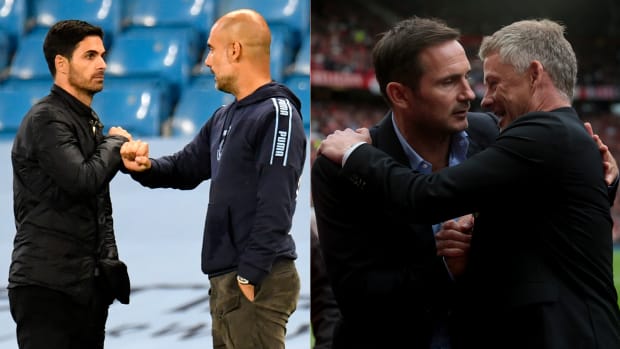The FA Cup has lost some of its luster over time in England, but circumstances surrounding this season's edition make it clear that the stakes matter for the four powers left standing.
When the football season resumed in England, it was already obvious Liverpool would win the Premier League title. Nobody quite knew if or when the Champions League would resume. And it rapidly became apparent that amid a glut of games of questionable value, the FA Cup had fresh allure. There were still team changes for the quarterfinals–old habits and the relatively meager financial rewards available still play their part–but amid what remains of the season, it’s the Cup that stands out. It is the highlight of what remains on England's domestic calendar.
The FA Cup has been declining in significance since the advent of the Premier League, something reflected in dwindling crowds. When fans have bought a season ticket for the league campaign, it’s only natural for them to take a break and save some money by not going to the additional games, even if an FA Cup tie might, under usual circumstances, be more enticing than a midtable clash. But when no fans are allowed, what rapidly becomes clear is that knockout football brings a drama and an edge of its own, something that can under normal circumstances be disguised by the relative lack of atmosphere at some FA Cup games.
And so we come to a pair of semifinals that, while comprising the usual suspects (four Big Six teams) both have their own clear background narrative. On Saturday, there’s a classic meeting of master and apprentice as Pep Guardiola’s Manchester City faces Mikel Arteta’s Arsenal. And then on Sunday it’s a battle of two young managers whose seasons will probably end up being regarded as positive, although major questions remain about both.

In one sense, this has been a hugely disappointing season for City. It’s lost nine league games. For the first time in a long time, questions have been asked about its recruitment strategy. A glass jaw has been exposed: beat the press and City is vulnerable, and not just to the elite, but also to Wolves, Southampton and Norwich. After it was banned from European football, the entire project was thrust into doubt.
Fresh from winning its appeal at the Court of Arbitration for Sport, though, and with the League Cup already won, City could end up claiming a treble of two domestic cups and a Champions League title that would be the club's first. It has the motivation of the vindicated–even if the CAS verdict raised as many questions as it answered about City’s conduct. It also has the motivation of something to prove after a league campaign that exposed so many weaknesses.
Arteta, having served as Guardiola’s assistant until the end of last year, should be as well-placed as anybody to take advantage. Nobody can realistically doubt the magnitude of the task he has taken on–any optimism that had started to build was quickly tempered by defeat in the North London derby last weekend. He is imposing a philosophy, reshaping a squad and developing young players. It will take time. But that doesn’t mean that success in the FA Cup wouldn’t be a very useful sign of things moving in the right direction, particularly given Arsenal has lost its last seven in a row against City, including the dismal 3-0 defeat in the first game after the end of the shutdown.
Sunday brings a repeat of the first weekend of the Premier League season, when Frank Lampard’s Chelsea went to Ole Gunnar Solskjaer’s Manchester United, enjoyed long spells of possession, hit the woodwork twice, and lost 4-0, ripped apart on the counterattack. It’s a problem that has dogged Chelsea all season. No side has conceded so frequently on the break in the Premier League. Even if Chelsea keeps clean sheets in its final two games, it will be its second-worst campaign defensively in 23 years. An inability to correct that, and a vulnerability to set plays, threaten to undermine all the good work that has been done in integrating young players and attacking play.
United has won all three meetings with Chelsea this season and is on a run of 19 unbeaten in all competitions. The arrival of Bruno Fernandes, clearly, has made a huge difference. But United remains a streaky side and has not played at all well in drawing against Southampton or even in Thursday’s 2-0 win over Crystal Palace. Solskjaer has done much to build a sense of well-being, and it’s significant that players clearly like and respect him, but there remains a major question about whether he has a plan against the elite other than simply sitting deep and countering.
For both Lampard and Solskjaer, FA Cup success would offer a sense of validation. The recent tendency has been for the competition to be a minor added bonus, or scant consolation after a poor season. For the first time in a long time, it feels like it actually matters in a more profound way to all four semifinalists. Paradoxically, the absence of fans has served as a reminder of how much it can mean.